#Our Epidemic of Loneliness and Isolation
Explore tagged Tumblr posts
Text
The Loneliness Epidemic: Understanding the Crisis and Creating Meaningful Connections
Evelyn Bilias Lolis, PhD
Dean & Associate Professor
School of Education & Human Development
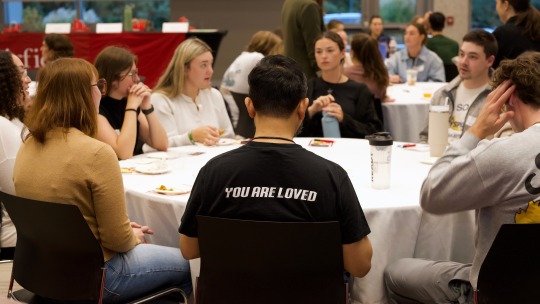
A recent report from the U.S. Surgeon General highlights a growing public health crisis in America: loneliness, isolation, and a lack of connection are pervasive issues affecting millions. These feelings of disconnection can profoundly impact both physical and mental well-being, contributing to the alarming statistic that more than one in five adults and over one in three young adults in the U.S. are living with a mental illness.
In response to this urgent need, Fairfield University’s School of Education and Human Development hosted a panel discussion recently, entitled, Combating the Loneliness Epidemic: Science. Connection. Healing.
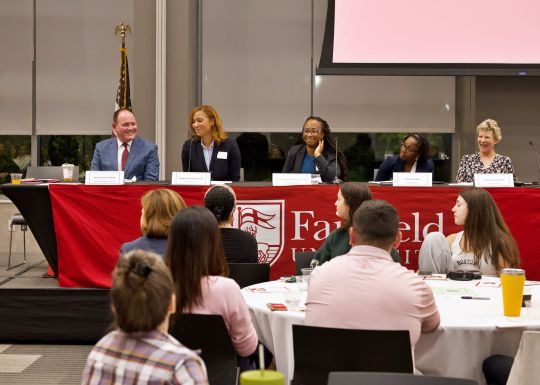
Dean of the School of Education and Human Development, Evelyn Bilias Lolis, PhD, moderated the discussion on the impact of loneliness, and strategies for creating connections, following her opening remarks:
In a brief released last year, Dr. Vivek H. Murthy, MD, the 21st U.S. Surgeon General, highlighted a national epidemic of loneliness and social isolation in his advisory titled, “Our Epidemic of Loneliness and Isolation.” He noted that nearly half of U.S. adults, especially young adults, experience significant loneliness, which adversely affects physical, mental, and social health.
Loneliness is defined as “a distressing experience stemming from perceived isolation or inadequate meaningful connections.” The operative word here is “perceived”. The emphasis on “perceived” is vital, as the sense of connection is deeply personal, hinging on how individuals feel seen, understood, and valued within their families, communities, schools, or organizations. One's subjective appraisal is the most essential feature; a person may be surrounded by others yet still feel profoundly lonely, while someone who appears solitary may experience no loneliness at all. Ultimately, the true measure of loneliness lies in personal perception.
Why should we, as an institution of higher education and as the School of Education & Human Development, care about this issue and be moved to draw critical dialogue around this matter? Two reasons come to mind. The first and obvious is that this is a public health crisis. Scientific research has firmly established that loneliness significantly increases the risk of cardiovascular disease, stroke, diabetes, depression, anxiety, and even premature death. These findings are not merely isolated; they have been consistently replicated across studies. To put it starkly, the health risks associated with social disconnection are comparable to smoking up to 15 cigarettes a day. Yes, prolonged feelings of disconnection are as detrimental to your health as smoking almost a pack of cigarettes a day.
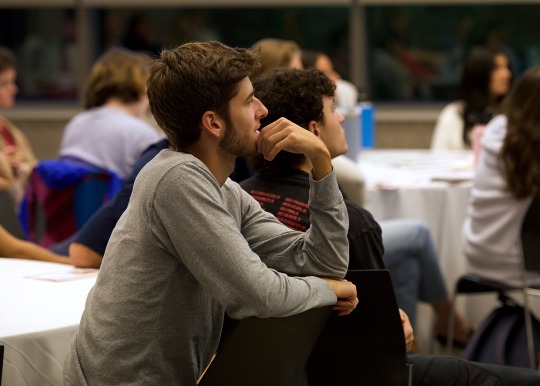
The second, equally compelling reason we care is rooted in our identity as a modern Jesuit Catholic university. We are dedicated to shaping the minds and hearts of our students to cultivate compassion, to see and care for the whole person, to walk alongside the marginalized, to confront injustices, and to become powerful agents of healing, advocacy, and transformation in society. We strive to empower everyone who graduates from our institution to champion the right to a hope-filled future for every human being they serve in the world.
There is no doubt that we have our work cut out for us. The loneliness epidemic is multifaceted in causes, and equally complex in its remedies. It affects each of us individually and all of us collectively. This epidemic highlights the interconnectedness between individual and societal health. My well-being affects not only myself, but also everyone I serve in my personal and professional circles. You see, social connection exists at the intersection of "you and me," where our stories intertwine, where your existence finds a place in mine, and where we seek solace in each other’s care at the most fundamental level of our shared humanity.
We would be remiss if we didn’t acknowledge that social connections are eroding in our society. Our social networks are shrinking, our reliance on technology is increasing, and opportunities for genuine, “no strings” quality social interactions (free of objectives, transactions, outcomes), are few and far in between. When we observe children in their natural environments, particularly during play, we witness the essence of mindfulness—what it means to being fully present and savoring the joy and leisure of another human being’s company. As adults, we often lose this very ability amidst our responsibilities, distractions, and duties to produce. The need for intentional opportunities for connectedness, for self and other need to become at the forefront of our shared objectives.
Hence, we gather here tonight united by a common purpose: we care. We care about our children, our schools, our campuses, and our communities. We feel compelled to take action. Intential, thoughtful, and planned action.

This is why I believe the School of Education and Human Development is the ideal venue for this discussion. We train educators, school-based mental health professionals, clinical mental health agents, marriage and family therapists and social workers, and leaders in social justice advocacy—individuals who will be at the forefront of addressing loneliness and isolation. We are the epicenter of interdisciplinary and intergeneraltional professional preparation, community engaged scholarship, and premiere expertise in matters of education, learning, and mental health.
While the loneliness epidemic poses serious challenges, it also offers hope—both in aspiration and research. Time and again, we witness the profound impact of individual connections and the sacred ripples they create. The power of one becomes the hope of many.
*The expert panel included Fairfield University alumni, campus wellness workers, community psychologists, and leaders in philanthropic efforts dedicated to combating youth disconnection: Michael Pisseri, a Fairfield University alumnus, and principal of Davenport Ridge Elementary School in Stamford, Conn.; Clinesha Johnson, PsyD, clinical psychologist and assistant dean of students at Fairfield University; Wendy Mendes, licensed mental health counselor and director of student wellbeing at Fairfield Bellarmine; Samantha Miller, portfolio director at Dallio Education; and Paula Gill Lopez, PhD, a nationally recognized crisis response trainer, director of Fairfield’s School Psychology program, and co-founder of the Connecticut Center for School Safety and Crisis Preparation. A group connection activity was facilitated by Melissa Quan, EdD, director of Fairfield University’s Center for Social Impact.
#Loneliness Epidemic#Fairfield University#Evelyn Bilias Lolis#Dr. Vivek H. Murthy#U.S. Surgeon General#Our Epidemic of Loneliness and Isolation
0 notes
Text
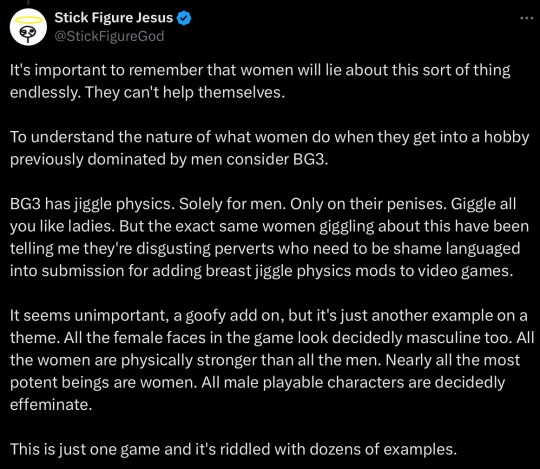

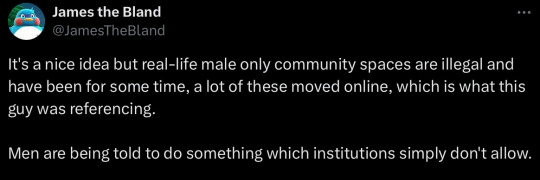



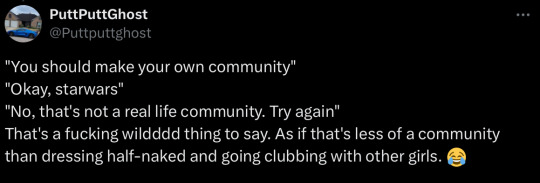

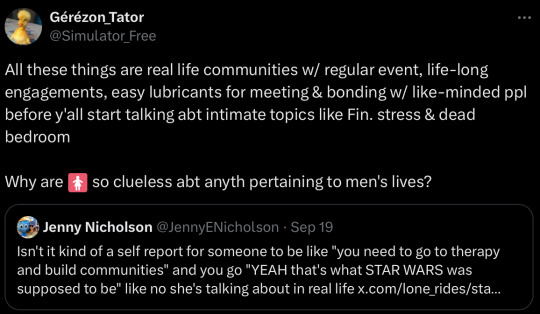
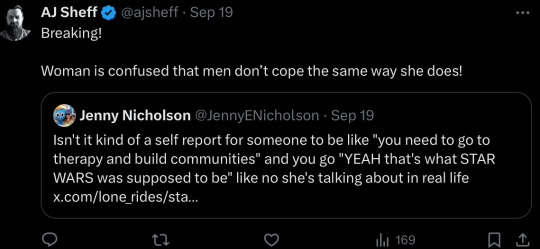
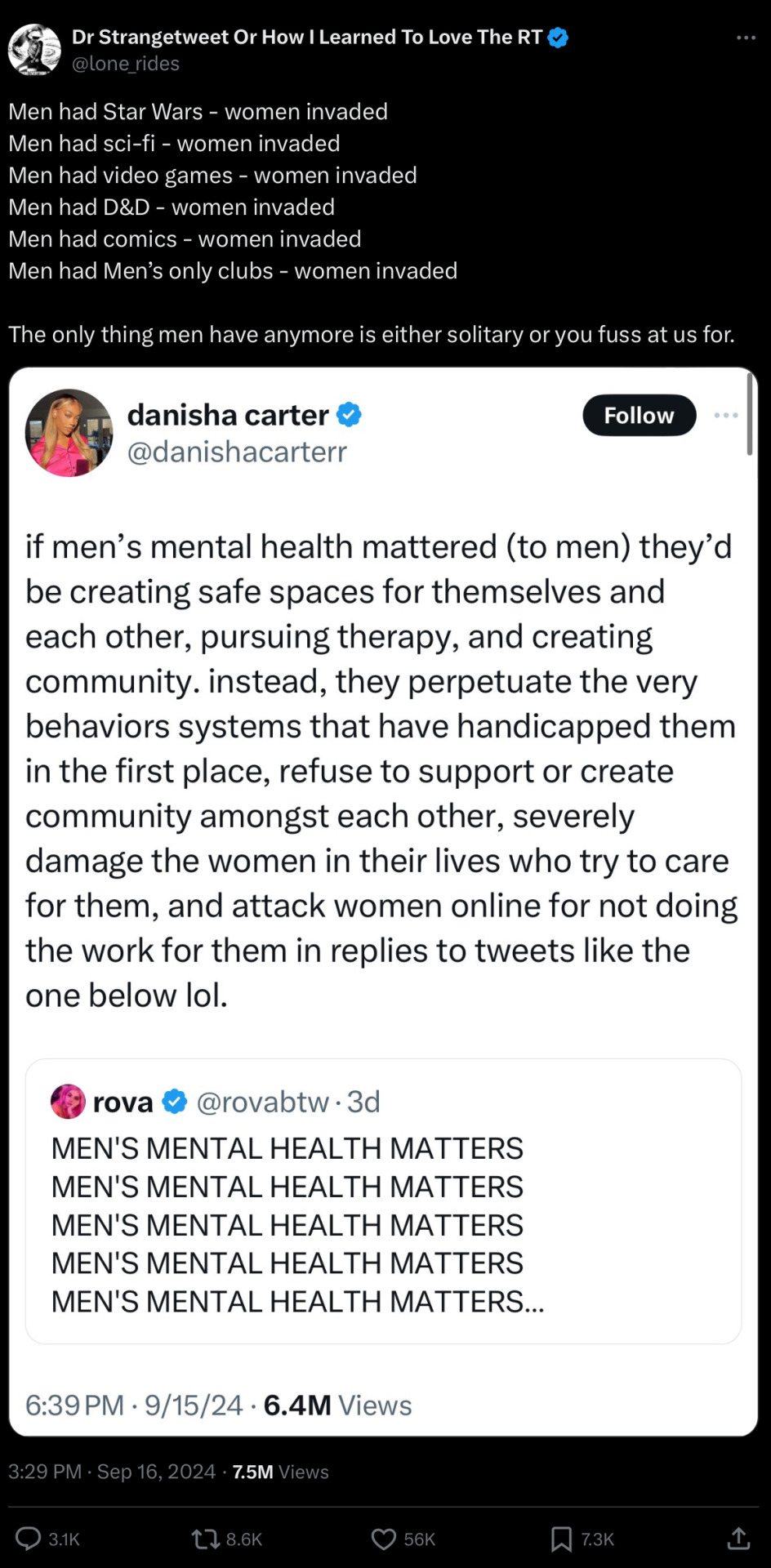
(The bottom one is the tweet she responded to originally)
Like honest to god if this is how you think then you should just give up on living at this point bc tbh you’re wasting valuable air that a woman could be breathing instead
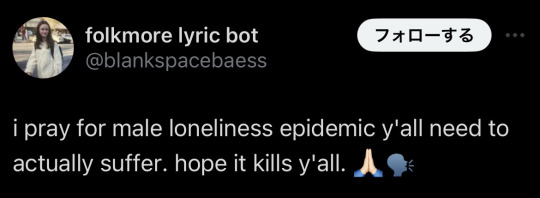
me reading the comments on Jenny Nicholson posts
#The “male loneliness crisis” if we’re gonna be silly and pretend that’s a real issue for a second#is caused by men not expressing their feelings and creating a society where expressing their feelings is “wrong” and “womanly”#And expressing affection is met with “what are you - gay?”#It’s an entirely self inflicted problem#Mentally ill men aren’t feeling lonely and isolated because women exist in the same spaces as them. Women are in fact always the ones#putting themselves out there and trying to help these sorts of guys. I personally think they shouldn’t but unfortunately they do.#Like notice how men with a lot of good female friends are almost always happier and more healthy and confident#The problem isn’t women#The problem is literally spelled out in these angry sexist tweets#“Sorry we don’t express our feelings like you Fffeeeeemalesss”#Yeah thats the issue bruh#Men will have a whole group of friends#And they’ll still feel lonely because they’re actively upholding a standard they set#To never express themselves in any way that seems vulnerable#I’ll tell you right now as someone who kept my “serious” issues close to my chest for a long time#That’s what kills you#You can know tens of people and you can go to lunch with them and you can talk about your interests#But at the end of the day you still come home and feel alone when you really need support#This fundamental misunderstanding of how basic human connection works among sexist men is so sad but I can’t even feel sorry for them#Because at the end of the day they’re whiny bitches who chose this for themselves#They choose at every turn to hate women instead of loving each other#Because to them hatred of women is more important#56k likes on that original tweet#Tells me enough#fuck yall#End it now for all I care#I hope your little self victimizing epidemic gets worse
37 notes
·
View notes
Text
wrt the male loneliness epidemic bs i think it's important to discuss how strongly the current western state of affairs isolates everyone. not "just" men. the thing is that men believe they are entitled to their loneliness being amended by women. and when feminism began to show that women didn't have to suffer being in that position, instead of making certain to be someone people (women included) would want to be around, already-radicalized men hated those women, and non-radicalized men became prime targets of radicalization. that's what, in praxis, it means to be a feminist man (or an ally, or a deconstructed masculinity), though: it entails giving up that which you believe is owed to you by virtue of being a man. that's why deconstructed masculinities are as much of a goal as empowered feminities and trans identities.
so, to summarize. men are lonely because everyone is. capitalism, white supremacy, misogyny and other axis of the kyriarchy are set in motion to retain status quo by punishing community and solidarity. men are not especially touched by this phenomenon. but since there is a dissonance between what they were promised by patriarchy and what they effectively access in this case their entitlement flares up, ravenous for upholding the patriarchal edict of "men must be tended to by women, in detriment of women"
there is a general loneliness epidemic. it just so happens that it impugns pre conceived promises of the patriarchy. the answer should in every case be to build community and form bonds that enable us to struggle against isolation and individualism; never to demand that another person or a collective tends to our needs in their own detriment.
#don't look back#unfortunately for us as long as men and particularly cis white men aren't shedding their privileged positions#feminism will make scarce progress without coordinated action#either you need class traitors or a holistic and forceful movement#i wasn't going to post this initially but i think it's important#this post was made by Marxist Leninist Maoist person with 10+ years in feminist movements 👍🏼
497 notes
·
View notes
Text
JUST so we're clear.
When people talk about a loneliness epidemic among men, they are not:
Ignoring the fact that loneliness and isolation are problems that affect huge swathes of our society;
Saying that women need to solve the problem by being nicer to men.
They are talking about the fact that our socially enforced standards for men's behavior lead to:
Men tending to have smaller social networks in general;
Men not having anyone they can turn to in times of distress for emotional support;
Men being overly reliant on female partners for emotional support which is unfair to their partners;
Men having a much higher tendency towards certain kinds of mental illness that are known to be caused/exacerbated by isolation and loneliness;
Men not having the emotional skills and knowledge to even verbalize their emotions in a way that would let them ask for help;
People not reaching out to support the men in their lives after a tragic or traumatic event;
People downplaying men's attempts to talk about their pain or loneliness as whining;
Much higher suicide rates among men.
I could go on.
99 notes
·
View notes
Text
we need to make misandry the norm at this point and we need to insure that the male loneliness epidemic consumes these fucking assholes completely. when this many men are able to entirely disregard the lives of women & queer people as a whole we need to continue to isolate them and let them rot alone. they do not need to be in our social spaces and they do not need to feel entitled to a goddamn thing.
21 notes
·
View notes
Text
When asked about the 'loneliness epidemic,' Global Logistics Network spokesperson Odo Fucklanyard stated "We've been looking very closely into the latest research regarding loneliness and social isolation, and we are very pleased with the results. Cultivating loneliness has been such an effective means of managing our human resources that we might not need to keep doing all that debt slavery. Maybe."
When asked about Fucklanyard's comments, GLN sole co-founder Meng "Harold" Jianli stated "Comments like that are unacceptable, and this is the last straw. As of today, the GLN is no longer considering Ivy League graduate candidates for upper management positions. This is the best America has to offer? Dipshit failsons who can't go five minutes without saying the quiet part out loud? You don't know how good you fucks have it, back in the 2040s I could have dropped a nuke on Virginia and the rest of the world would have thanked me, but I wanted to make amends and give you fucks a chance, and this is what you have on offer? Fucking going on camera and saying 'yeah, sure, we might abolish debt slavery'? Fuck off. I said fuck off, that's an order!"
When asked for her opinion regarding the GLN's new hiring decisions, Sunny Roosevelt stated "I don't like to get political, I'm just the president."
66 notes
·
View notes
Text
The 2024 election confirmed several things: We as a nation are deeply divided, distrustful of each other, and dissatisfied with the ability of government to get things done. While distressing, that news is not new. Indeed, sociologist Robert D. Putnam has been sounding the alarm about growing isolation and eroding social capital since long before the “loneliness epidemic.” While the internet has in some ways made us more connected than ever, it is also polarizing and paralyzing when it comes to collectively solving problems.
At the national level, bipartisan collaboration to identify the systemic sources of our economic and social distress will be a long time coming. In the meantime, voters still want someone to address the chronic challenges they see in front of them in the places where they live and work.
In short, the rise of the digital world means that in the real world, we have more work to do than ever to solve problems. The good news is that in the remaining places where people mix and encounter those they don’t already know—whether that’s their neighborhood Main Street or downtown—the seeds of solutions already exist. At this hyperlocal level, individuals and institutions avoid ideological arguments, build trust, and do the on-the-ground work—often starting with public spaces—across the civic, nonprofit, private, and public sectors.
By examining the proven record and growing importance of hyperlocal, place-based partnerships, we can better understand how to grow the role they play in addressing some of the country’s problems—one commercial corridor, one park, one downtown, or “one ZIP code at a time.”
14 notes
·
View notes
Text
This just makes me think of all the accusations towards so called "TERFs" and "misandrists".
The truth is that 99% of ""men haters"" who do say "yes all men are part of the problem", still never talk about any sort of violence being imposed on men.
It's mostly "I wish men would drop dead", or "I wish men's victims would get their revenge". Nothing of that compares to the level of graphic violence and disgusting behavior idealized by even the "chillest" incel. And on that note, nothing like the fantasies of violence trans identified males often discuss. The "most tame" incel presented here still buys prostitutes without any shame about it.
It really infuriates me to think that men continue to hurt women and abuse children and then turn around and say that feminists are just as bad.
This is such a fucking tired condition. When will we wake up as a fucking society? I wish people would at least be honest in their constant prioritizing of male feelings.
All this talk of poor men who live in the edges, poor trans identified males, all these men who don't fit in, who are weird, who are autistic, who are not "playing the society game"... As if women don't present as weird? As if all women fit in? As if all women and girls are seen as normal, or correct. As if we are not lonely and isolated and sad.
The different is that men take their hurt and use it as an excuse to hurt others or to want to hurt others. And women too often take their hurt and turn it against themselves. Destroy themselves, with self harm and eating disorders, and worse.
The tired statistic about how males commit the most suicide keeps shadowing the statistic that females attempt suicide two to four times more often than men, but fail.
The now apparently widely accepted talk about the epidemic of male loneliness completely disregards female loneliness because we are silenced in our isolation. Because we ourselves don't frame our isolation in this way.
If a tree falls in the forest and no one's around to listen, does it make a sound?
If a woman suffers in silence, does her suffering still matter?
Is what it takes for one's suffering to be taken seriously to be violent and dangerous like incels are?
Why is men's loneliness a problem, but femicide and rape still widely disregarded?
My theory is that it's because men are active in destroying people and things around them when they self destruct.
Women too often implode, taking out only themselves in the wake. And sometimes even surviving self destruction, going on as a zombie.
When asked how we can reach the general incel community who hasn't questioned their violent and hateful ways, a former/recovering incel answers "treat them as human, that's all they really want".
When will we women be treated as human? Women and girls are raped and abused and murdered and groomed and tortured. We are seen and treated as subhuman.
But beware the hurt male's broken ego. It has shards that will pierce you through your heart.
12 notes
·
View notes
Text
there's this genre of posts that makes it out like it's a huge red flag if you don't have any friends from x or y groups of people in real life like bro our world is more isolated than ever & there's a loneliness epidemic. I have probably 5 people irl I'd say I'm truly close friends with there's only so many demographics you can hit.
46 notes
·
View notes
Note
.....girl wheres that ask u have calling adhd the sysyphus of diseases why on earth does adhd give you rejection sensitivty AND bad time management AND no relationship degration. you cant have all of that during a loneliness epidemic.
non patriarchal god was up in the cut making adhd like 'i am going to make one of thee most isolating disorders' personally i think the rsd was a step too far bc how you gonna make it where some of us literally cannot stop talking abt our interests AND make it where we go into a fucking tailspin if anyone just doesn't seem too interested in what we have to say 😭😭😭😭😭 how im weird and sensitive to ppl thinking im weird
12 notes
·
View notes
Note
Why are men so threatened by female friendships? There’s this thing on hell-site #2 (Twitter) where a woman asked what was the worst thing a friend has done to you. A bunch of ppl (mainly women) opened up and the men jumped in to be like ‘see? female friendships suck/are surface-level/etc.’ Like, a girl couldn’t even talk about how much she loves the female friendships in her life without a man being like ‘lol just wait till they get a man/till someone gets jealous.’
I don’t claim to know anything about male friendships, but I will say that from what I’ve seen, they aren’t very fulfilling. Men will say that they don’t even know their friends’ birthdays even after knowing each other for 8+ years. I saw a Reddit post where a dude said that he has a golf buddy that he’d meet up with every weekend for 5 years and that they’ve never had a conversation about their lives, but that that’s his best friend after his dog. I’m sorry, is that supposed to be a friendship?
And then in the same breath, men will complain about male loneliness and say they have no one to talk to about their issues.
Like, sure. Sometimes female friends can backstab each other and be jealous and talk shit and betray each other, shit happens. But they can also fulfill you and nurture you and care for you and support you through anything and everything, and I feel like that’s a testament to how deep female friendships can be. Friendships require vulnerability and knowing one another well. Male friendships (at least the ones I described) do not have that depth, so of course they don’t fall out or betray one another or anything. They don’t actually know each other well enough to even be able to betray one another.
To me, female friendships can be high risk and high reward. Women can hurt one another badly, but we can also love each other to the fullest, and it’s only because we let each other get close.
Idk, I’m drunk rambling, but moral of the story is that women’s friendships are very dear to me and I hate it when men talk shit about them.
Insecure controlling men love isolated women and miserable women. A friendless woman is usually not very happy
They like nothing more than to convince women we have nothing to gain by building bonds with other women. They want proof that we're to blame for all our issues so their behaviour is irrelevant. A lot of men struggle with the idea that women have the same interiority as them so can only ever caricaturise us, especially when we're imperfect and messy.
You're right, female friendships can be high risk high reward
It's one thing getting a day wrong but how don't you even know the month of your friend's birthday?? My memory is bad but so I have to go out of my way to remember birthdays but I go out my way regardless
The male loneliness "epidemic" is crazy because a lot of it is self inflicted or men thinking their negative feelings are more profound. How many women become mothers and barely have friends and no one gave a fuck, In fact people told them off because " you decided to become a mother"
There is a loneliness epidemic among all demographics because of how difficult the modern world can make it.
19 notes
·
View notes
Text
I don’t know if we’ll ever see the mental health gap between straight people and gay people close, at least not fully. There will always be more straight kids than gay kids, we will always be isolated among them, and we will always, on some level, grow up alone in our families and our schools and our towns. But perhaps that’s not all bad. Our distance from the mainstream may be the source of some of what ails us, but it is also the source of our wit, our resilience, our empathy, our superior talents for dressing and dancing and karaoke. We have to recognize that as we fight for better laws and better environments—and as we figure out how to be better to each other. I keep thinking of something Paul, the software developer, told me: “For gay people, we’ve always told ourselves that when the AIDS epidemic was over we’d be fine. Then it was, when we can get married we’ll be fine. Now it’s, when the bullying stops we’ll be fine. We keep waiting for the moment when we feel like we’re not different from other people. But the fact is, we are different. It’s about time we accept that and work with it.”
— Michael Hobbes, “Together Alone: the Epidemic of Gay Loneliness,” Highline / Huffington Post, 02 March 2017.
I still often think about this passage—how there will always be less gay people than straight people, and that most of us homosexuals will grow up alone until we’re old enough to go out and meet others like us. It’s always left a bittersweet taste in my mouth, but I have to accept that we will always be different, and that’s okay.
33 notes
·
View notes
Text
I'm seeing posts about amatonormativity but they don't seem to be made by people that have sat with every angle of the subject (fair) so here's my two cents with an angle I've yet to see. Forgive my lack of simplicity and language mistake. Can't afford to write better for now.
It, the nuclear family, the idealisation of a singular monogamous partner and marriage are largely modern concepts, at least in the form they now take anyway. And the whole point of the thing is boosting capitalism and keeping community fairly divided. If we're sectioned off in groups that mostly focus on and care about only people that live in our house with us, where does that leave the collective?
Helping anyone outside is a drag, it's too difficult, it's too much. Engaging anyone outside is a drag, it's too difficult, it's too much.
Why is it so inconvenient?
There is a loneliness epidemic.
On valentine's day, there are a lot of reasons people become severely upset.
You could ask yourself if you're aro, of course, but don't reduce that just to a label—it's a journey, and plenty of aro people spend a long time thinking they want a partner when they really wanted a best friend, or someone who focuses on them before anyonelse without all the excess bullshit, but not all aromantics want that either. We can argue about semantics and where we draw lines in the sand for eternity but ultimately it's individual, it's about what you want and how you want it and how you view that.
If the label helps you find your community then it might be for you. I know I used to be, but I didn't fit in there quite right. I became an identity anarchist instead—I found labeling myself so vaguely confuses people more than it helps. But that's my opinion about me and my parameters.
I digress.
Especially if you seethe with jealousy when you see couples that at least seem to click just right, that show it off but ask yourself if what you need most is an actual support system.
And an actual support system can include a partner, of course, but it should not be compromised of Only or Mostly a partner. But don't mistake this for me saying not having more than that is an individual issue; quite the opposite.
Imagine, a community of people that you can properly interact with and rely on.
Do you have someone or a group even for every side of you? Do you have places you can go to engage with different aspects of yourself and society in a pleasant and meaningful way? Are they accessible? By which I mean, can you actually make it there, and as often as you need to? Can you stretch out parts of yourself too complicated/unrelatable for one group to understand by engaging with another? Whenever you need advice, can you think of a person you can reliably ask, which varies by the subject you need help with?
Do you have someone you can cry to without having to pay a therapist? Do you have anyone who'll be your rubber ducky in a pinch, that you can rely on to have faith in you to grow and not antagonise you for what you said or did once forever?
They don't have to be able to offer advice beyond normal capabilities. Crying to your friends and accepting their advice (which is admittedly usually mediocre BUT still gives something abundantly helpful—a different perspective you don't have to pay money for but friendship instead) is an old social behaviour of humans. Bitching to friends so they can comfort you and/or help you see where you went wrong so you can be more reasonable with the people they're upset with is much the same.
But more and more I saw the attitude of saying "seek therapy, friends aren't for that" rise. And worst, it escalated to "strangers aren't for that", which tells me with the lack of anyone to depressurize with people just started spilling uncontrollably more. And what are they met with? It being called trauma dumping, being pushed farther in to isolation.
I'm not saying every friend needs to "allow" or "put up with" that. That's why it's a COMMUNITY. If the thought of a friend venting to you drives you up the wall—good news! Other people LOVE being that friend, so you don't need to be them, or get personally heated like that. Maybe you're just not That Type of friend. I don't know, I'm not you.
But in a community you can depend on the fact that there will be someone who enjoys everything if only you could mingle enough to explore it and individuals enough to find that out.
In community we challenge ourselves of course! It's full of compromise. But ideally we accentuate our strengths instead of focusing on forcing ourselves through our weaknesses pointlessly. We can lean on eachother for help. It's give and it's take and we pay with favours and trust and joy and quality time and more so that we can keep the support going without burning out; we give.
Humans did not EVOLVE to function alone. Like it or not, we simply can't. The closest we can do is blind ourself to how much the hands of others play a part in our life and wonder why things aren't going so smoothly when we avoid them or they retract, and we're more alone than perhaps we ever even intended.
How do we go back from here?
Who does it benefit if the only question you ask is "why don't I have a partner?" and perhaps "why don't I feel like I can handle one even if I want one"
And the latter is a reflection of this; they'll say you shouldn't put Everything on your partner, but fail to discuss why that's a reoccurring issue in the first place!
Who does it benefit if you're not asking "Where is my community, and how do I help build it?" instead.
Because I don't think it's you!
We all deserve to be well adjusted. And amatonormativity is never going to lead to a society made of mostly well-adjusted people. Almost all of us in places where we've been robbed of community are severely under-socialised, and that ranges to places with apparent community which is largely compromised of vapid attitudes that allow people to have friends at such an arms length that we still feel alone.
We deserve better than that.
8 notes
·
View notes
Text
the loneliness epidemic genuinely supercharges parasociality and the general inclination to get too-attached to public or semi-public figures, fictional or otherwise, and i think we should talk about that more and the figures themselves less.
humans are social creatures, and we do NOT do well in isolation. the first danger is mental and emotional. loneliness causes depression, anxiety, compulsions, psychosis, and more. the second is physical. loneliness literally weakens your immune system and makes you more likely to become sick and less likely to recover from illness. when it becomes chronic, it can permanently change your brain chemistry into what is currently called "extreme social deprivation" and trigger predispositions to life-long mental and physical illnesses like cancer or schizophrenia. this is why solitary confinement is a human rights abuse. [american loneliness context under the cut]
we crave a soundscape that includes the movement of others, the drumbeat that means "you're not alone." under the strictures of increasingly isolated and atomized american life, that need has to be filled somewhere. so we turn to the third space we do have—the internet—and we listen to recordings of the social interaction we crave. this is called an indirect belongingness strategy, and why podcasts are so popular. no direct social connection, but enough of one to keep social deprivation at bay. we saw this really kick into gear with the invention of the radio, the ability to transmit spoken words into remote places and private spaces en masse. after the loss of forums and self-hosted websites, "space" doesn't so much exist on the internet anymore (everybody is on 4 websites) but people very much do. and a large enough congregation around one person turns more and more into a space the closer you get. the stronger their influence, the more social feedback, the more feelings of community, the stronger the enforcement of rules and norms (which feels like safety rather than control when you're nervous and unsure, which lonely people often are).
your access to your primary community space where you get most of your social feedback is now tied to your ability to maintain proximity to this person online, and your proximity to this person online fundamentally requires habitual isolation and the need for indirect belongingness strategies. your ability to meet others like you, forge connections, and maintain them is now tied to both the existence of your loneliness and your ability to maintain proximity to this person. and this is a really powerful position to be in. digital relationships can hold further damage at bay, but they cannot fully satisfy your social needs, like just enough water to keep you both thirsty and alive. we don't actually live in the cloud. our meat suits need in person social feedback or the meat computer in your head gets glitchy. so what happens is this constant low level lack of satisfaction breeds a desperate attachment to the digital parasocial community. you're so thirsty you're desperate for the water you know you can access, but it's never enough and you're too scared of getting truly dehydrated to leave and find another source.
and if you can't maintain proximity to that person, suddenly a lot more goes away than just the silence of your kitchen. if the locus of your parasocial community is found committing some wrongdoing, suddenly you're forced to question and possibly give up your primary avenue of social interaction along with what it means about you that you congregated there, that you have connections there, and that you don't actually want to leave. where will you go next? how will you find people like you again?
your similarity to this person being the avenue by which you find and maintain social connection ties that person up in your identity FAST. so in the end, any threat against the object of your parasocial fixation becomes an existential threat to you and your ability to maintain social, mental, and emotional equilibrium.
⸺
the inverse of "loneliness kills" is also true. strong social bonds literally make you healthier. cancer patients with family that routinely visit during hospitalization are more likely to recover. the latine paradox refers to the way latine communities routinely buck lifespan expectations despite typical socioeconomic obstacles like healthcare access, and it's because of the strength of their communities and social bonds. everyone's an aunt or cousin, and bloodlines are rarely what's referenced in those relationship statements. the "more likely to recover with visitors" effect has basically been turned into a cultural +2 constitution/health modifier.
we've been trained to think that you have to move out at 18 and the goal is to live alone and completely free and independent until you get a spouse and have a family. utterly atomized. completely on your own. this isn't really financially possible for most people anymore, but having a roommate is still considered a "fall back." not the ideal, not the real life you're trying to build. so instead of imagining their living space as a breathing thing, they end up with roommates they barely know and don't speak to and call that a good deal because there's no drama. as independent and unconnected as possible with another person in your house.
the isolation of the home life is exacerbated by the collapsing fabric of american society. third spaces have almost completely disappeared, nobody can leave their house for free anymore, and two or three whole ass fucking generations have lowkey fucked their ability for spontaneous social interaction and do not know how to meet people on top of an economic collapse and climate crisis. older gens can't comprehend the problem or explain a solution beyond "go sit in a place that has people and talk to some of em." so we're lost, stuck, confused, uncomprehending of what our needs are or how to meet them. which carries the benefit to the capitalists of more rent payments, more grocery bills, more wasted food when one person can't eat a whole loaf of bread in 5 days, more stress trying to cook and clean and keep a space positive on top of whatever work you do. like your own self-induced odyssey of isolation and extra chores. your daily life turned into a rube goldberg ass version of sisyphus' pushing that boulder up the hill only for it to roll straight back down.
6 notes
·
View notes
Note
My favorite thing to see people say irt thinking misandry exists in any meaningful way is stuff about the Male Loneliness Epidemic as though every single person in our capitalistic society isn't constantly battling emotional isolation, burnout and expectations they have no say in. Like they just think women aren't people lmfao
exactly, every example of misandry is something that also happens to women but gets ignored because it's happening to women
6 notes
·
View notes
Text
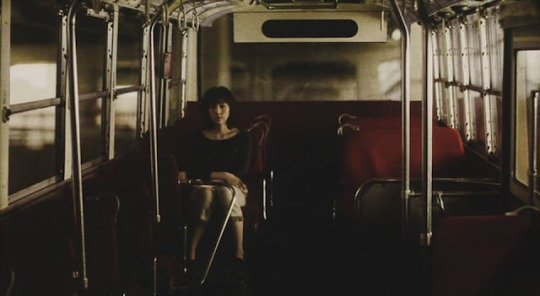
What an interesting premise that was terribly disappointing in execution. This is possibly going to be very critical, whoops.
The premise of Pulse is very fascinating. I love a good ghost story, or multi-dimensional story, especially when you tie in some aspects of tech-horror that this film has. And I do love a good apocalypse, especially a creeping one that you don't realize is happening until its too late. Those aspects of this film I appreciate. However, man what the hell.
So, clearly the conversation that this film is trying to tackle is about how the creation and ease of access of the internet is creating a worldwide epidemic of loneliness and isolation that is slowly killing the population. Not in any drastic way (though in some instances, yes, with the first death where he hangs himself) but in a looming, subtle sort of dissolving of sense of self. The people that get this... virus or whatever literally fade into surfaces and leave behind an imprint of the body. It acts like a computer virus--but it's really just highlighting what's already there. (In the case of Harue, who said she's always been alone. It's not a surprise she naturally turned to the internet/computer science to fill that void).
All of these aspects I genuinely enjoyed. The execution was dismal and confusing. I spent so much of the movie getting genuinely irritated by the logical leaps the people were making. Like, they would somehow immediately know things or suddenly forget important things, and it kept happening throughout the middle of the film that I was actually getting pissed off because it rapidly took me out of the story. Like the shit about the spirit realm being overwhelmed and having to come here, but then why are they making more spirits? Who aren't hanging around really all that much except for the few times someone hallucinates them? And then also it just wipes out everyone on the Earth? Stupid shit. Why did you bring up that random story if it has no relevance? Or is it related, and the message just got lost?
It had such a strong start, too, and even with the slow, creeping realization of what's going on, the end felt like the script writer got lost in his own sauce and forgot what story he was trying to tell. It became a weird jumbled mess that just repeatedly smashed you over the heat with a metal baseball bat about how terrible the internet is for society. Which like, totally valid, especially in 2001 but dude we get it. I got it the first 600 times you said it, I still get it now. I didn't get brain damage or alzheimer's in the last 20 minutes since you told me you were lonely.
Another positive I can give this film is the use of unease and discomfort of the use of shadows throughout this film. It was incredible. Possibly one of the best to do it, especially with all the people lurking (makes me think of Hereditary). I spent more time focusing on the background than the foreground, waiting to see what shadow was gonna move.
Another negative, this was so predictable. So, so, so predictable. Great idea. Mid execution.
Now, my theory is that the red used throughout is somehow the protector. Obviously, the red tape seals the door--but could it have been any tape? Probably, but they chose--and continued to choose--red. It is EVERYWHERE in this film. I think that's why our main girl survives. When shit starts really kicking off, she's always tied somehow to red, be it on her clothes or directly around her. Same with the loveable idiot Kawashima who wears his red hawaiian shirt until his dumbass changes to green and walks into that opened door.
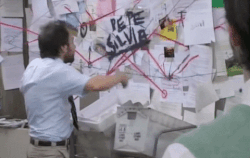
I love how bleak this movie is but I hate everything else.
4 notes
·
View notes